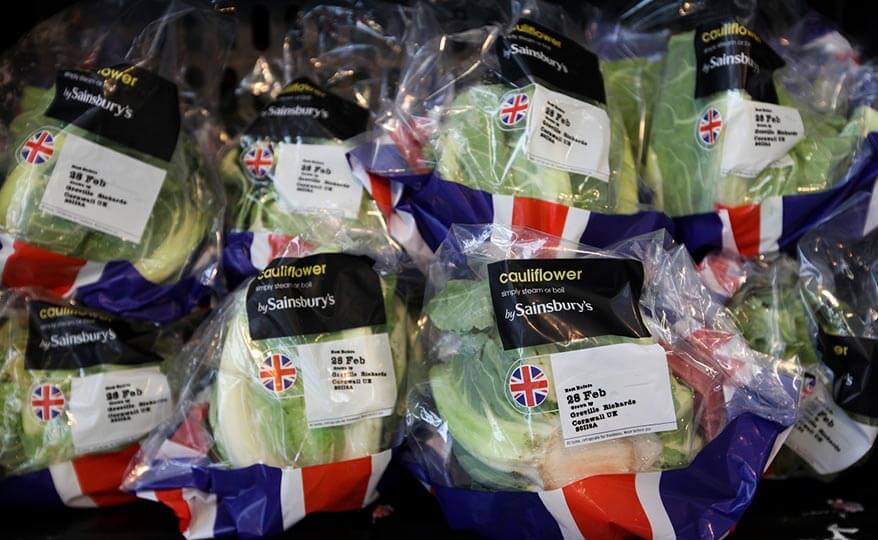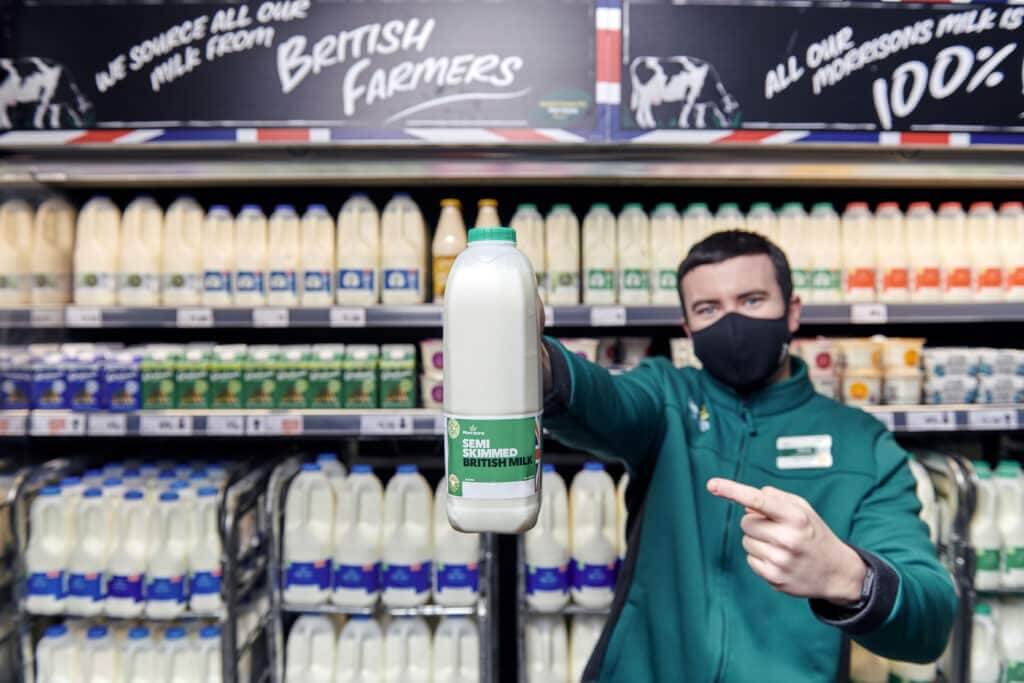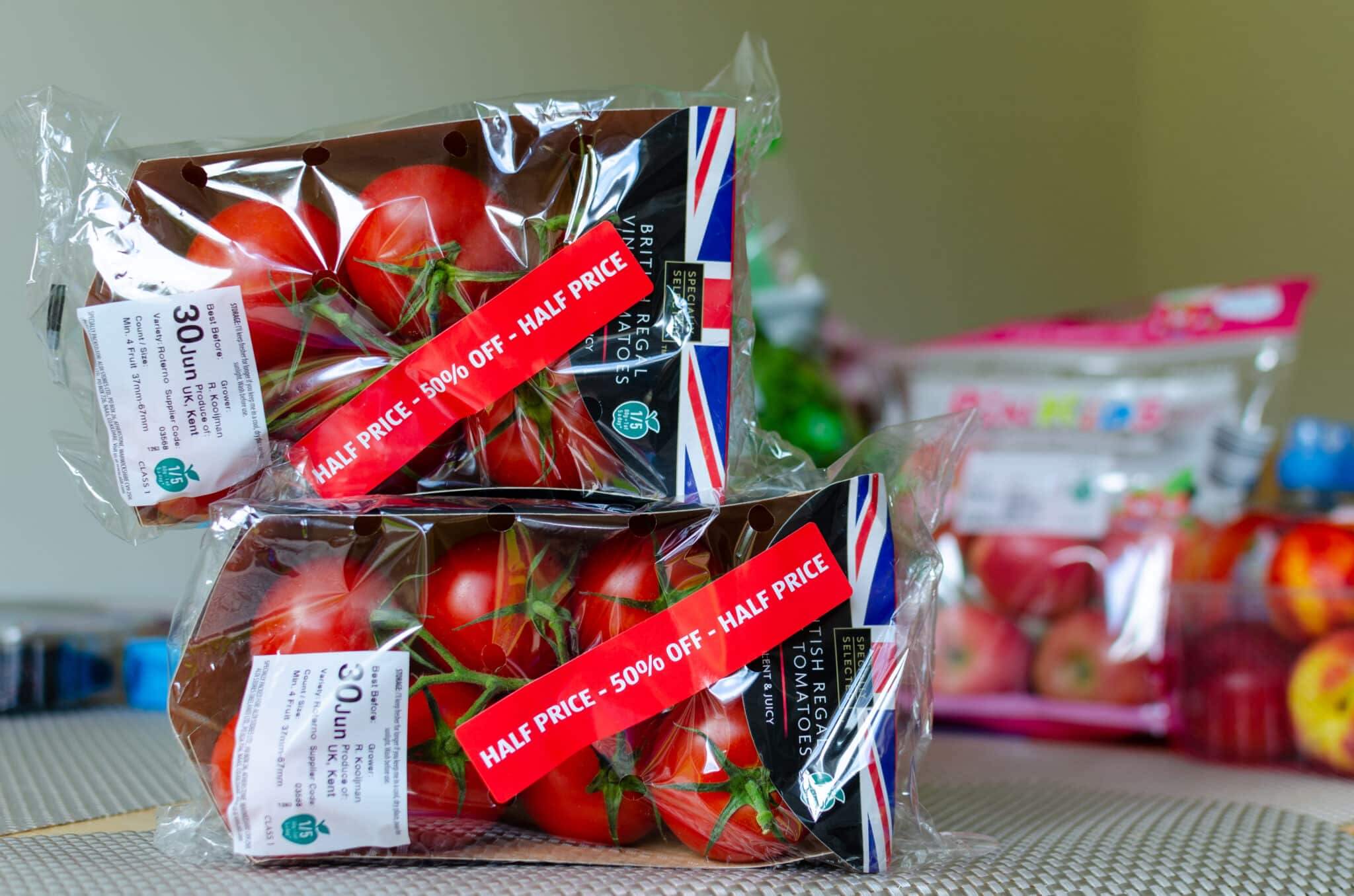Date labels are an increasingly hot topic when it comes to tackling household food waste.
In November 2022, the food waste charity Wrap reiterated its calls for retailers to ditch all unnecessary food labels. The NGO recommended the removal of all Display Until labels, Use By where not legally required and any labels on the majority of uncut fresh produce. The change would see food waste cut by at least 350,000 tonnes per year, they claimed.
Many major supermarkets have begun to follow their advice. In July, M&S said it planned to remove Best Before labels from 300 varieties of fruit and vegetables in its stores; the following month Sainsbury’s went one step further, with plans to eliminate Best Before dates from a total of 1,500 items, a move that it said would save up to 17 million products from being unnecessary chucked away each year; Morrisons followed suit in December, stripping labels from nearly 200 of its own products too, and in February the Co-op also committed to removing Best Before labels from many fruit and veg lines.
Nearly all have advised customers to ditch their reliance on date labels when it comes to assessing the quality of their food and use their own judgement instead.
But is the so-called ‘sniff test’ really a safe alternative to date labels? And will empowering people to rely on their five senses reallycut waste?
First, it’s important to draw a distinction between Best Before and Use By dates, says Clare Grantham, operations manager for food safety at The Safer Food Group. Use By dates are legally required for products like meat, fish or ready-to-eat salads as they likely contain pathogenic bacteria which cause the product to become unsafe over time. It would be unsafe to strip away these date labels. Best Before dates on the other hand indicate quality, taste and freshness instead. For these, sensory or – organoleptic – checks can be used safely to check work out whether or not a product is still good to eat.

“For instance, the sniff test is a good one for some foods, including milk and eggs, but it’s best used in addition to other checks such as looking for solid lumps in milk or trying the water test on eggs by placing them in a water to check if they sink or float,” she says. “Any eggs that float are unsafe to eat, as it shows that air pockets have expanded inside as the egg has aged.
“For fruit and vegetables, check for blemishes, mould, and growths, alongside feeling for softness and bendiness. Visual checks are useful for bread products, where white, blue, or black areas of mould are indicators of spoilage. Mould can also often be detected by smell, and bread will harden as it deteriorates.”
Only half (52 per cent) of adults believe that food past its Best Before date is perfectly safe to eat.
But will people trust their own assessments or are they still likely to throw perfectly good food away? Well, there’s evidence that a good proportion of consumers already rely on taste and smell to check the quality of food. Three quarters (77 per cent) say they’re likely to apply the ‘sniff test’ to check on the status of food a day or two past its expiry date, according to a 2022 study by retailer Curry’s, and plenty ignore date labels altogether. Almost a quarter of people say they keep ketchup for up to six months too, despite bottles stating the product should be opened and eaten within eight weeks.
To hit the right balance, education will be a key part of the equation, says Jamie Crummie, co-founder of food waste initiative Too Good To Go. “For us the approach is threefold,” he says. “We’d like Best Before dates to be removed on products where it’s not legally required, such as many loose vegetables and fruits, oils, chewing gum and salt.
“Second, we’d like a transition from Use By to Best Before where it’s safe to do so, for example on dairy products. And the final call would be to educate people.” For instance, only half (52 per cent) of adults believe that food past its Best Before date is perfectly safe to eat, found research commissioned by the group in 2022, with 20 per cent worried they’ll get sick if they ignore it.

Behavioural nudges on packs will be part of that process of empowering people to trust their instincts, Crummie adds.
We want people to avoid food waste; pouring milk down the drain is pouring money away. Jamie Crummie, co-founder of Too Good To Go.
During a 2021 campaign that Too Good To Go ran alongside major food and drink brands, including PepsiCo, Danone and Nestle, a label that read ‘Pass my date. Look, smell, taste – don’t waste’ was added to products and a similar label could be adopted by other brands and retailers “so it prompts people to use their senses. It’s something we’ve been doing for generations but it’s now a case of let’s formalise that and give people power to do it themselves.”
There’s rarely been a better time to make a strong case to consumers for reducing their household food waste either, he believes. “In the context of a cost-of-living crisis, we want people to avoid food waste; pouring milk down the drain is pouring money away.”
In fact, a survey in 2022 by Too Good To Go found that the average Brit wastes around £303 worth of food each year as a result of following Best Before labels. “If we can educate and empower people, that’s £303 that families can have back in their pockets.”
Top tips to cut food waste
Plan ahead with shopping lists and meal plans.
Use your freezer. A surprising amount of fruit and veg can be frozen very effectively.
Try food waste apps to share leftovers.
Know your labels and trust your senses. Find out more here.










I’m not concerned about using my judgement on using food at home and use things well beyond the date. But I do like to know how fresh fruit and vegetables are when I buy them. I avoid buying things with a short shelf life when I know I won’t use them quickly (being a single person household). With no dates on labels I find I’m wasting more. It’s okay when I can select individual items like lemons but harder when buying packs.
I will only buy things I can examine now, I bought a bag of sainsbury organic potatoes which is a solid bag not a see through one to get home and find them all rotten, staff are obviously failing to keep an eye on stock rototation without dates. And the garlic bought was all yellow and dry and unusable. Its so frustrating not having a choice in purchasing short dated or past their best products. Fortunately I rarely have to buy in supermarkets due to Riverford.
I’m sorry to say that the cynic in me suspects that the removal of best before dates will result in supermarkets leaving products on shelves for longer, resulting in consumers unpacking their shopping baskets to find fruit and veg that is spoiled or inedible. I’d like to understand, with the removal of best before dates, how supermarkets know when to remove stock from sale?
Far better just to order your fruit and veg from Riverford of course, who I trust!
My understanding is that some retailers use a coded system which doesn’t explicitly state the date, but that if you’re an employee you’d understand how to decipher. I think most supermarkets will be cognisant of the risk that spoiled goods will do to their footfall and so will likely manage well with the above type of system, or even increase the focus on varieties which keep for longer periods (but which invariably taste of nothing!).
I imagine that most food waste comes from supermarkets that have overstocked perishables, rather than home waste (surely people don’t buy any food that they’re not going to eat soon afterwards?). If supermarkets don’t mark use-by dates, how will they know when to pass imminently outdated food to food banks?
I find the majority of my food waste comes from not being able purchase the actual quantities I want. This is the same whether you shop at a supermarket or via Riverford. There are some exceptions, such as single apples & single baking potatoes. But most other fresh fruit & veg comes pre packaged in set sizes. This is understandable for things like raspberries etc. which need some form of protection, but doesn’t make any sense to me for things like onions, mushrooms, tomatoes, oranges… Shopping at a local market seems to be the only sensible way to purchase what you need.
The above advice is definitely practical.
Here are some extra tips. I add easily-removed labels to food bags upon arrival, i.e. fresh herbs, milk, cream, veg, fruit, meat, fresh pasta, etc. Tip: wash herbs and dry them in kitchen paper, saving a damp piece to wrap the bunch of herbs in, then return to the open, hopefully ‘compostable’ bag, and keep in a crisper. (Some Riverford herbs in my crisper dated January are still in use.) Parsley, coriander, thyme last well. Mint is better used at once or grown on your windowsill.
Also – whatever official BB or UB advice you get – when you open sealed packages, tins or jars of food, such as yoghurt, tofu, or jars of artichokes and olives in winter to eke out the winter veg, move whatever you don’t use to a spare, well-cleaned glass jar and add a label with the date of opening.
With milk, as above, I definitely augment my label with a sniff, milk being an especially whimsical fluid. And, when using milk for hot drinks, I always heat the milk until it’s just warm. It’s saved me from many a mug of a curdled coffee.
Going further, milk might have a UB date of 18/3/23, for instance, but have turned by the 15th. As has happened several times recently with one distributor. Conversely, a different provider of milk, also during February-March has, strangely, sold milk that far surpassed its UB date (both were organic).
One lot came from the UK, the other from Guernsey, so different weather conditions may well have affected the cows’ output. Incidentally, milk freezes well so why not freeze half of it on the day of arrival? Again, I use recycled glass jars. But, when freezing, do leave 10cm of space between the liquid and the lid for ice expansion). Then I use the remaining milk in the container until the sniff test is whiffy. I also freeze bread, coffee, cheese and butter.
With the wide and incredibly varied range of food items one can buy, these days, labels of your own are often a simpler guide as to whether those olives or artichokes will last as long as the producer suggests (or doesn’t suggest). After a while, you ‘get the drift’ of how long anything might last. ‘Might,’ not ‘will’ as, like milk, your own experience is probably the most reliable answer.
Produce with seed oils in (anathema to me) – on the rare occasion that I discover they’re present after buying something – seem to last a much shorter time than an almost identical, home-cooked product, which will generally lack GM products, sulphites, glucose, industrially-produced seed oils, nitrates, colouring, etc, Old Uncle Cobleigh and all.
When I first began studying ingredients, largely so that I could deal with a diagnosis of cancer in 2020, I was blown away by the peculiar things in bought food. Suffice to say, I went totally organic, adding cancer-fighting spices and herbs to a largely raw veg diet (Green Med Info is a great online resource) and said ‘no thanks’ to multiple offers of surgery and irradiation. Within six months, there were no cancer markers. My doctor said he nearly fell off his chair at the results
Thank you for your tips and insights, very interesting, and we’re so glad to hear of your recovery.
I’d like to know some sort of date like when it was packaged because some shops would have them on shelves forever